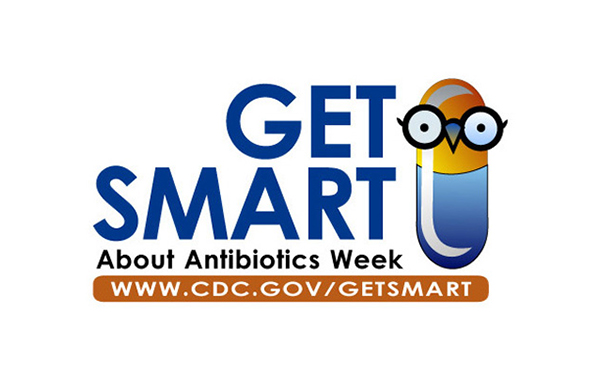Treating Acute Bronchitis Without Antibiotics

When you schedule a sick visit with your primary care physician (PCP), you generally have one goal in mind: to feel better! Let’s say you are diagnosed with acute bronchitis, but to your surprise – or perhaps, dismay – your PCP does not prescribe antibiotics as a course of treatment. Well, he or she is not alone, as doctors nationwide are being discouraged from treating acute bronchitis, among other viral illnesses, with antibiotics.
Get Smart About Antibiotics Week – November 16-22, 2015
The Centers for Disease Control and Prevention (CDC) observe Get Smart About Antibiotics Week every year to raise awareness about the importance of appropriately prescribing antibiotics. According to the CDC, each year more than 2 million Americans become infected with diseases that are resistant to antibiotics, and of them, 23,000 will die. Keiji Fukuda, MD, Assistant Director-General Health for Security at the World Health Organization recently warned that “without urgent, coordinated action by many stakeholders, the world is headed for a post-antibiotic era, in which common infections and minor injuries which have been treatable for decades can once again kill.” The White House issued an executive order in 2014, charging the federal government to “work domestically and internationally to detect, prevent, and control illness and death related to antibiotic-resistant infections by implementing measures that reduce the emergence and spread of antibiotic-resistant bacteria and help ensure the continued availability of effective therapeutics for the treatment of bacterial infections.”
Still, the use of antibiotics remains the single most important factor in antibiotic resistance worldwide. Up to 50 percent of antibiotics prescribed in the United States are not necessary, or are not being used in ways that are optimally effective. As previously mentioned, one example is the incorrect prescribing of antibiotics for treating acute bronchitis in adults.
About Bronchitis
Bronchitis is a condition that causes the bronchial tubes to become inflamed, leading to wheezing, shortness of breath, chest tightness, and a low grade fever. Exposure to secondhand smoke, fumes, dust, and pollution are the usual culprits. It can also be transmitted through coughing and physical contact.
The most common symptom bringing patients in to see their PCP is a cough, with acute bronchitis being the most common diagnosis. About 90 percent of the time, acute bronchitis is caused by a virus. Information such as this is what led the National Committee on Quality Assurance (NCQA) to add the avoidance of antibiotics treatment in adults with acute bronchitis (AAB) to the Healthcare Effectiveness Data Information Set (HEDIS), which assesses patient care and service based on a predetermined set of performance characteristics.
It is important to note that acute bronchitis can be caused by bacteria, but it is rare, especially in otherwise healthy patients. Further, when a patient has a co-morbidity, such as cystic fibrosis or other respiratory diseases, antibiotic use may be appropriate. In such cases of possible bacterial bronchitis in patients with a co-morbidity, when an antibiotic is prescribed, proper documentation and coding at the time of diagnosis is essential.
What are CDPHP® Providers Doing to Improve the AAB Measure?
As a result of the implementation of the AAB measure, CDPHP set out to educate providers and members alike on this important topic. Carsten Stracke, MD, a St. Peter’s Health Partners urgent care physician, recently completed his second year of 100 percent HEDIS AAB compliance, and is among the CDPHP participating providers doing outstanding work. Born and raised in the Capital Region, Dr. Stracke decided to pursue urgent care medicine because he values treating patients with acute conditions, and helping them feel better quickly.
After reviewing the research surrounding worldwide antibiotic resistance, Dr. Stracke was on board with supporting the HEDIS AAB measure.
“My patients may come in expecting an antibiotic, but I take the time to educate them about why it is not the best course of treatment, and work on treating what’s making them sick in ways that are far more effective,” he said.
He also reminds patients that there are unpleasant side effects to antibiotics, including nausea, diarrhea, and rashes.
Dr. Stracke recommends that providers do their own research on the antibiotic resistance issue, including visiting the CDC, which offers a host of resources.
“Look at underlying evidence-based medicine rather than just treating patient expectations. You may be satisfying their wishes, but not necessarily doing what’s best for them. With Zithromax® now being ineffective 35 percent of the time it is prescribed, we as physicians really need to do our part to address the antibiotic resistance threat to public health.”
Important Reminders and CDPHP Resources
The best defense against illness remains good hygiene. Proper hand washing and overall cleanliness go a long way in preventing the spread of germs. When it comes to your individual health care, remember that it is important to develop a relationship with your PCP. While urgent care centers are viable resources for treatment during off-hours or weekends, your PCP has a comprehensive understanding of your medical history, and can advise you on the best course of action for your needs.
If you are interested in finding a new PCP, use the Find-A-Doc feature. You will be able to narrow your search to practitioners in your area who are accepting new patients, indicate whether you have a preference for a male or female practitioner, and find providers who speak multiple languages to serve you best.
 The Daily Dose
The Daily Dose
Comments are closed.